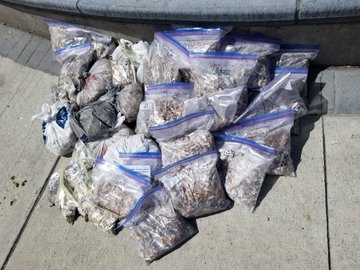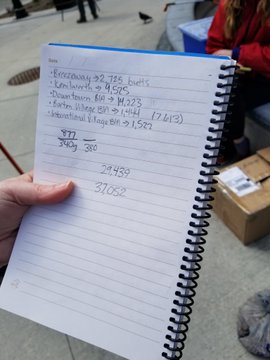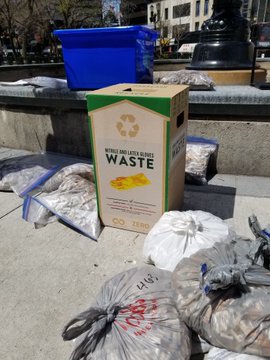The Sweet Potato introduces black plastic recycling program
Black is the new recycling for The Sweet Potato.
The Toronto grocer recently introduced a recycling program for black plastic after belatedly discovering it is not accepted by the City of Toronto. In a recent blog post announcing the program’s creation, The Sweet Potato said it was surprised to learn that Canada’s largest city doesn’t recycle black plastic.
The company said it believed it had made a “prudent and environmentally sustainable choice” when selecting its own black plastic containers, only to discover it had unknowingly contributed to the problem of plastic waste.
“It just seems crazy that all these people are at home with black plastic from us and it suddenly has to become garbage,” The Sweet Potato’s founder and co-owner, Digs Dorfman told Canadian Grocer. “So we just decided to let people bring it back themselves.”
The Sweet Potato is inviting customers to bring clean black plastic and baby food pouches to the store’s customer service desk during operating hours. It will accept black plastic even if it isn’t from its store, said Dorfman.
Black plastic containers are a mainstay of restaurant and grocery stores, used primarily for takeout food items such as rotisserie chicken. The Sweet Potato had been using black plastic containers in its grab-and-go business, as well as for items such as cut vegetables and fruit (the company has since stopped using them in the produce department and will soon phase them out in its prepared food section, said Dorfman).
While neighbouring municipalities including Brampton, Mississauga and Caledon all recycle black plastic, Toronto said it was unable to do so for two reasons: It can’t be mechanically sorted at the recycling facility because it is not recognized by the optical sorting technology, and there is “no stable market” for the volume of black plastic generated by the city.
As much as one-third of the material in blue bins is improperly disposed of, according to the city’s website, with black plastic among the primary offenders. It urges residents to dispose of it in the regular garbage.
The Sweet Potato’s new recycling program is being carried out in partnership with TerraCycle, which will send the plastic to its facility in Fergus, Ont. TerraCycle, which bills itself as a global leader in collecting and repurposing “hard-to-recycle” waste, said it had recycled billions of pieces of waste since its 2001 formation.
Sustainability and the environment are among The Sweet Potato’s core values, said Dorfman. “It’s pretty central to what we do,” he said. “Environmental concerns are one of the most significant priorities for us whenever we’re making any type of decision.”
The store is promoting its recycling program through a combination of in-store signage and social media posts, said Dorfman. Staff have also been trained to answer customer questions about the program.
The Sweet Potato stressed this wasn’t intended to be a permanent solution, noting it didn’t believe private solutions were the appropriate fix for public programs such as the state of public recycling infrastructure.
“We hope you will continue to advocate for a more sustainable civic infrastructure,” states the blog post. “In the meantime, however, we’re very glad that we won’t all have black plastic cluttering up the place or going needlessly to landfill.”
The Sweet Potato’s program comes amid growing awareness of the environmental impact of plastic waste and increased consumer pressure on businesses of all types to eliminate single-use plastics.
Grocery chains around the world have introduced initiatives aimed at curbing single-use plastic items such as bags and food packaging. Last month, for example, Metro announced it would allow its customers to shop using refillable containers.

 Canon Canada, HP Canada, The Printing House, Symcor and Xerox Canada have been recognized as some of Canada’s Greenest Employers for 2019, based on the criteria of Mediacorp Canada Inc., which manages Canadian employment programs and events.
Now in its 12th year, Canada’s Greenest Employers is a competition that recognizes employers that create a culture of environmental awareness. Winning employers, selected by editors of Canada’s Top 100 Employers, are evaluated using four main criteria: Unique environmental initiatives or programs they have developed; whether they have been successful in reducing their own environmental footprint; whether their employees are involved in these programs and contribute unique skills; and whether their environmental initiatives have become linked to the employer’s public identity, attracting new employees or customers.
“We are proud to be recognized for our continuing commitment to the environment and sustainability,” says Nobuhiko Kitajima, President and CEO of Canon Canada. “We are guided by our corporate philosophy, Kyosei — all people, regardless of race, religion or culture, harmoniously living and working together into the future — and this recognition reflects our commitment to helping shape a more sustainable world for not only our local communities but also the global community at large.”
Mediacorp explains some of the reasons why the following companies were selected as one of Canada’s Greenest Employers (2019), among a range of initiatives:
• Canon Canada celebrated Earth Week by hosting its second annual Environmental Education Day and welcoming over 100 grade six and seven students for a day of fun awareness workshops, hosted in partnership with local organizations such as the Toronto Region Conservation Authority, Credit Valley Conservation, Earth Rangers, and the Ontario Clean Water Agency.
• HP Canada manages a number of programs to help employees make healthy choices at home and at work, including a free onsite health screening clinic, wellness webinars on topics such as mindfulness and work-life balance, and a global wellness challenge to encourage employees to get physically active every week for a total of six weeks (employees receive redeemable points for participating).
• HP Canada supports new mothers and fathers, including adoptive parents, with maternity and parental leave top-up payments as well as the option to extend their leave into an unpaid leave of absence.
• The Printing House is a major advocate of responsible paper procurement, actively promoting high-recycled content paper and Ancient Friendly Forest paper products for its customers, with over 92 percent of paper purchased being environmentally certified last year
• The Printing House supports a number of environmental initiatives throughout the year, including the WWF CN Tower Stair Climb for Nature and The Great Canadian Shoreline Cleanup (in partnership with the WWF and Ocean Wise). The company also partners with the Forest Farmer organization to ensure that one tree is planted for every new account opened at The Printing House, planting nearly 4,000 trees since 2015.
• Symcor supports unique “nooks” in common areas where employees are free to drop-off used books, movies and music, allowing them to share and recycle used items as well as enjoy something new. Additionally, IT employees recently established a dedicated Tech Hub Library, which features technology related books for exchange.
• Symcor supports a variety of in-house environmental initiatives, including an extensive recycling program to capture non-conventional recyclables, from flip-flops to candy wrappers to wine corks (offered in partnership with TerraCycle), to an internal elastic band and paper-clip collection and reuse program.
• Through Xerox Canada’s Bwell program, employees can access a number of online tools and health and wellness resources, including information on related initiatives, such as the company’s spring fitness challenge.
• Along with offering paid time off to volunteer, Xerox Canada manages the Xerox Employee Initiated Philanthropy program to provide financial assistance to non-profit organizations where employees regularly volunteer their time.
“Our process for incorporating social responsibility and sustainability into our operations and decision-making is ingrained into our culture,” says Andrew O’Born, Vice President of Business Development, The Printing House. “We’ve tried to create a portfolio of things that we keep adding to in order to support our environmental initiatives. In 2019 we will be steadfast in ‘going the extra mile’ to push through barriers, and change our habits to reduce our carbon footprint and improve our environmental impacts.”
Canon Canada, HP Canada, The Printing House, Symcor and Xerox Canada have been recognized as some of Canada’s Greenest Employers for 2019, based on the criteria of Mediacorp Canada Inc., which manages Canadian employment programs and events.
Now in its 12th year, Canada’s Greenest Employers is a competition that recognizes employers that create a culture of environmental awareness. Winning employers, selected by editors of Canada’s Top 100 Employers, are evaluated using four main criteria: Unique environmental initiatives or programs they have developed; whether they have been successful in reducing their own environmental footprint; whether their employees are involved in these programs and contribute unique skills; and whether their environmental initiatives have become linked to the employer’s public identity, attracting new employees or customers.
“We are proud to be recognized for our continuing commitment to the environment and sustainability,” says Nobuhiko Kitajima, President and CEO of Canon Canada. “We are guided by our corporate philosophy, Kyosei — all people, regardless of race, religion or culture, harmoniously living and working together into the future — and this recognition reflects our commitment to helping shape a more sustainable world for not only our local communities but also the global community at large.”
Mediacorp explains some of the reasons why the following companies were selected as one of Canada’s Greenest Employers (2019), among a range of initiatives:
• Canon Canada celebrated Earth Week by hosting its second annual Environmental Education Day and welcoming over 100 grade six and seven students for a day of fun awareness workshops, hosted in partnership with local organizations such as the Toronto Region Conservation Authority, Credit Valley Conservation, Earth Rangers, and the Ontario Clean Water Agency.
• HP Canada manages a number of programs to help employees make healthy choices at home and at work, including a free onsite health screening clinic, wellness webinars on topics such as mindfulness and work-life balance, and a global wellness challenge to encourage employees to get physically active every week for a total of six weeks (employees receive redeemable points for participating).
• HP Canada supports new mothers and fathers, including adoptive parents, with maternity and parental leave top-up payments as well as the option to extend their leave into an unpaid leave of absence.
• The Printing House is a major advocate of responsible paper procurement, actively promoting high-recycled content paper and Ancient Friendly Forest paper products for its customers, with over 92 percent of paper purchased being environmentally certified last year
• The Printing House supports a number of environmental initiatives throughout the year, including the WWF CN Tower Stair Climb for Nature and The Great Canadian Shoreline Cleanup (in partnership with the WWF and Ocean Wise). The company also partners with the Forest Farmer organization to ensure that one tree is planted for every new account opened at The Printing House, planting nearly 4,000 trees since 2015.
• Symcor supports unique “nooks” in common areas where employees are free to drop-off used books, movies and music, allowing them to share and recycle used items as well as enjoy something new. Additionally, IT employees recently established a dedicated Tech Hub Library, which features technology related books for exchange.
• Symcor supports a variety of in-house environmental initiatives, including an extensive recycling program to capture non-conventional recyclables, from flip-flops to candy wrappers to wine corks (offered in partnership with TerraCycle), to an internal elastic band and paper-clip collection and reuse program.
• Through Xerox Canada’s Bwell program, employees can access a number of online tools and health and wellness resources, including information on related initiatives, such as the company’s spring fitness challenge.
• Along with offering paid time off to volunteer, Xerox Canada manages the Xerox Employee Initiated Philanthropy program to provide financial assistance to non-profit organizations where employees regularly volunteer their time.
“Our process for incorporating social responsibility and sustainability into our operations and decision-making is ingrained into our culture,” says Andrew O’Born, Vice President of Business Development, The Printing House. “We’ve tried to create a portfolio of things that we keep adding to in order to support our environmental initiatives. In 2019 we will be steadfast in ‘going the extra mile’ to push through barriers, and change our habits to reduce our carbon footprint and improve our environmental impacts.”
 This week in Cannabis: Tweed and TerraCycle choose Earth Day to launch a new cannabis-waste recycling program, the Feds are set to approve a new saliva-testing device that detects recent drug use–but not impairment, and Shoppers Drug Mart launches a portal to buy medical cannabis in Alberta.
We’ve rounded up this week’s top stories from across Canada.
This week in Cannabis: Tweed and TerraCycle choose Earth Day to launch a new cannabis-waste recycling program, the Feds are set to approve a new saliva-testing device that detects recent drug use–but not impairment, and Shoppers Drug Mart launches a portal to buy medical cannabis in Alberta.
We’ve rounded up this week’s top stories from across Canada.
 A three-hour single-day clean up event has rid Hamilton of tens of thousands of cigarette butts in the city’s downtown core.
Saturday’s ‘Butt Blitz’ was an affair tied to a prevention program launched this past week, aimed at reducing cigarette litter across the city.
Individual volunteers armed with supply bags and gloves spread out around the city’s lower end to pick up butts in that neighbourhood.
Upon completion of the event, the city claimed volunteers had picked up 37,052 cigarette butts.
A month-long campaign to take cigarette garbage off Ontario streets was launched at the beginning of April with environmental preservation volunteer group
A three-hour single-day clean up event has rid Hamilton of tens of thousands of cigarette butts in the city’s downtown core.
Saturday’s ‘Butt Blitz’ was an affair tied to a prevention program launched this past week, aimed at reducing cigarette litter across the city.
Individual volunteers armed with supply bags and gloves spread out around the city’s lower end to pick up butts in that neighbourhood.
Upon completion of the event, the city claimed volunteers had picked up 37,052 cigarette butts.
A month-long campaign to take cigarette garbage off Ontario streets was launched at the beginning of April with environmental preservation volunteer group  A three-hour single-day clean up event has rid Hamilton of tens of thousands of cigarette butts in the city’s downtown core.
Saturday’s ‘Butt Blitz’ was an affair tied to a prevention program launched this past week, aimed at reducing cigarette litter across the city.
A three-hour single-day clean up event has rid Hamilton of tens of thousands of cigarette butts in the city’s downtown core.
Saturday’s ‘Butt Blitz’ was an affair tied to a prevention program launched this past week, aimed at reducing cigarette litter across the city.





